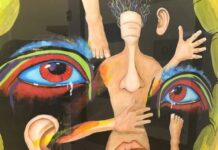Hearing Voices in the USA
The World Hearing Voices Congress will be landing in Boston, Massachusetts in August. The Hearing Voices movement is up against a lot in this culture where there's so little tolerance for uncertainty and exploration. This movement, this event, and so many people's lives depend on all of us to carry this perspective forward.
Large Study Confirms Elevated Risk of Diabetes When Prescribed Antipsychotics
A large longitudinal study finds once more that being prescribed antipsychotics significantly increases the risk of diabetes.
Why World Benzodiazepine Awareness Day?
I am participating in World Benzodiazepine Awareness Day today, and you should too, because you know somebody right now who is taking a benzodiazepine and that person might just be dealing with chronic health problems, unaware that they are result of taking the medication as prescribed.
Three Suicides: Honoring Lives Lost to Benzodiazepines
I am still trying to reconcile what these chemicals are capable of, how the urge can morph into an action, how we maybe just don’t understand suicide all that well. For me, the suffering was so intense it was too painful to stay alive. I understand how my friends felt in their last moments.
Tapering Strips for Benzodiazepines
One size fits all does not work. It is not possible to use the same tapering schedule for all patients who wish to stop with a certain drug. Therefore we had to come up with a flexible solution that was both practical and allowed doctors and patients to make the choice they deemed appropriate.
Researchers Discuss the Strengths of Children who Face Adversity
Experiencing adversity may result in the development of unique strengths and abilities that are often overlooked.
“Benzo Blue”: a Song of Protest and a Search for Liberation
In commemoration of World Benzodiazepine Awareness Day coming on July 11th, I am providing an early first time debut at Mad in America of a new song and music video titled “Benzo Blue,” along with a brief commentary on the evolution and significance of this song.
Senate Quietly Rubber-Stamps Trump’s “Mental Health Czar”
This “Mental Health Czar” appointment is moving below the radar of many people. The US Senate should be asking some tough questions of Dr. McCance-Katz before deciding on her confirmation. Everyone should contact their Senators, now!
When Switching Antipsychotics, No Difference Between Immediate and Gradual Discontinuation
Review study compares outcomes of gradual vs. immediate antipsychotic discontinuation when switching from one drug to another.
Uniting Critical Voices: Where can we Collaborate?
If we are to achieve the much-needed paradigm shift in the way we respond to human suffering, it is imperative that we unite. Given the powerful vested interests sustaining the dominant bio-medical model, a fragmented opposition will possess insufficient power to transform the system.
Researchers Find Brief Intervention for Preventing Self-Harm Ineffective
“These interventions also have the potential to increase rumination and negative affect, and potentially self-harm repetition, by serving as unhelpful reminders of negative experiences in the lead-up to the index self-harm event or during hospital treatment.”
So You Say You Want a Revolution Part Two
Establishing a comprehensive drug review map will make possible a complete assessment of the expenditures on psychiatric drugs. I predict that these expenditures are going to surprise and concern anyone responsible for managing these costs.
What Transgender Actors can Teach Medical Residents
A new training program teaches medical residents how to provide appropriate care and services to transgender clients.
Landmark Victory against the “Oak Ridge Torturers” — Do We Cheer or Cry?
With reports of the horrid abuse at Oak Ridge surfacing frequently over the years, how could this travesty have continued unabated for so long? What is wrong with the “therapeutic” community that what happened here was hailed as a major advance?
Study Shows Clozapine Can Result in Serious Gastrointestinal Complications
A large observational study published in CNS Drugs sheds light on serious adverse effects of the ‘gold standard’ antipsychotic Clozapine.
African American and Hispanic Youth Discontinue ADHD Treatment at Higher Rates than White Youth
Study examines racial and ethnic disparities in the quality of care for Medicaid-enrolled children starting ADHD medication.
No Psychiatrist Needs to Use ECT
Modern psychiatrists are taught that all mental disorder is biological in nature. As a result, they aren't taught psychotherapy, and when they get a complicated patient, they don't know what to do. Thus, they very quickly reach the limit of their skill set and have no option but to reach for the electrodes.
Unanswered Questions in New Mental Health Screening Program for Children
An article presents new screening tools for pediatric depression and anxiety—but fails to answer its own questions about efficacy.
Schizophrenia Deconstructed
After a few weeks it became clear to me the complete lack of comprehension that I faced as a person claiming to have been cured of psychosis. Being a schizophrenic claiming to no longer suffer from schizophrenia only made me seem more schizophrenic due to the current culture of psychiatry.
Psychological Research Fails to Capture Human Diversity, Researchers Call for Action
Data demonstrate an overreliance of non-representative and non-diverse sampling biases in psychological research.
Do Psychiatrists Harm their Patients out of Stupidity?
I think it is fair to say that many psychiatrists display an enormous lack of good sense and judgment. Psychiatrists are in the firm grip of a collective force field of an almost fundamentalist belief system that blinds them to the harm they unwittingly do and the human rights abuses they commit.
French and American Approaches to “ADHD”
It now looks as if the U.S. approach to mental health is fast gaining purchase in a country that formerly boasted a great, perhaps too sophisticated (Lacan et al.) psychoanalytic tradition, but also a holistic psychosocial tradition when dealing with psychological disturbance in children.
Data Shows That Nutrients Reduce Aggression: Why is Policy Not Changing?
Despite study after study after study showing that there is a simple, cheap solution to reducing aggression in many people, the message hasn’t carried through to changing policies or treatment approaches. If a drug were shown to reduce aggression with no side effects, would it be ignored?
Robert Whitaker Refutes Jeffrey Lieberman; But Is Psychiatry Reformable?
When the neuroleptics-are-necessary-to-treat-schizophrenia myth falls, psychiatry is finished. And that is why the Goff et al paper was produced: a desperate attempt to maintain its position by a profession that is truly on the ropes. For psychiatry this is a death-struggle.
Study Explores Correlates of Low-Level Physical Activity and Psychosis
A study examines the variables correlated with low levels of physical activity in persons diagnosed with psychosis in low and middle-income countries

































